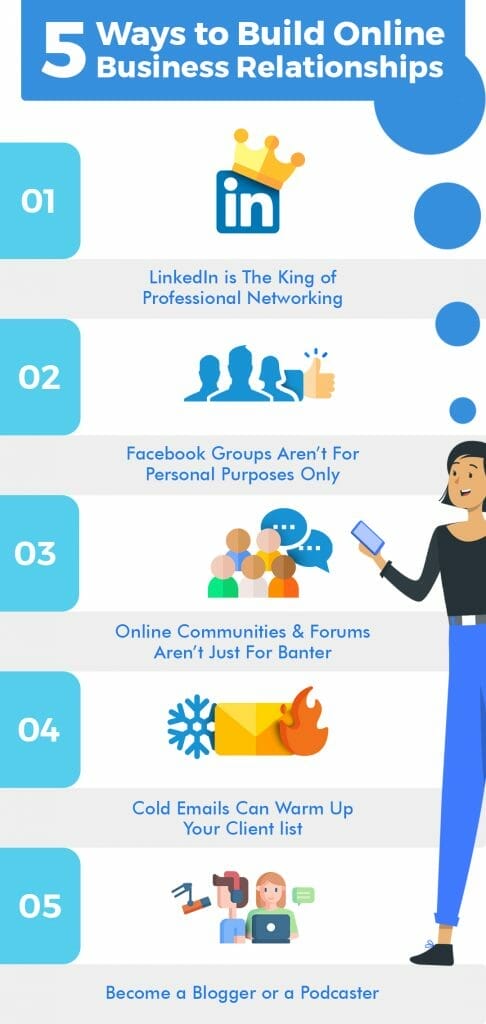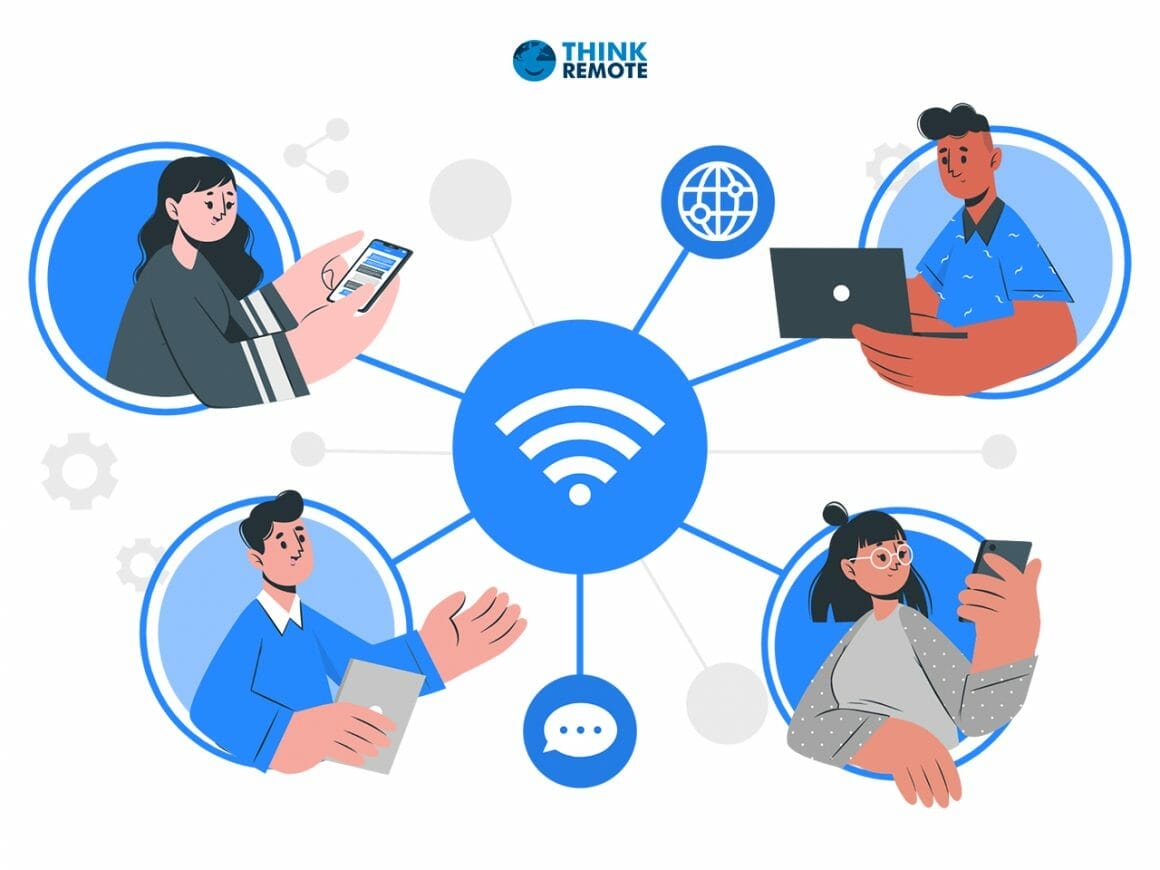Just sometime back, you could drive to a popular event and grab those business cards while networking with top executives. Why sometime back? You still can, but with most of the world going remote in their working style, there aren’t too many ground events. Most have transitioned to virtual events. This has given rise to the era of remote networking. Maybe you aren’t used to it yet, but if you step into one such event (virtually of course), you’ll know how useful remote networking is to grow your business online.
Is it possible to build strong online relationships? How does one get started, and where can one look for virtual events? Let’s guide you through everything you need to know about remote networking.
Table of contents
What is Remote Networking?
Remote networking is meeting and interacting with new people and prospects virtually. The idea is to find hundreds and thousands of business prospects online. You can talk to them, get on a video call even and figure out if there’s mutual professional interest and benefit. Via remote networking, you can find new customers, guests for your podcast, business or work opportunities, jobs, communities, and more. No matter the field you’re in, there’s a whole network out there for you.
What Are The Benefits of Remote Networking?
1. The World is Your Stage
William Shakespeare famously quoted: “All the world’s a stage.” Remote Networking allows you to interact with people from miles away. Regional boundaries don’t matter because the virtual world has none. There’s an opportunity for you in every corner of the world.
2. Introverts Don’t Have to be Awkward Anymore
It’s not that introverts can’t feel shy in a virtual meeting but it’s a lot better than their awkwardness in large crowds or in-person meetings. Besides video conferencing, virtual platforms enable interactions via text, making remote networking less intimidating if you’re a shy person.
3. You Save Lots of Money
In comparison to attending an on-ground event, virtual events cost much less, if at all. There’s no commuting cost, and you don’t spend on outside food, snacks, etc., either. Moreover, with remote networking, you can skip paid virtual events, as there are many accessible social media platforms and groups. . All you need is an internet connection.
4. Fewer Language Barrier Problems
Back in 2014, I went to an event in Germany where most people interacted in German only. I don’t speak German, and I don’t even understand it. I ended up with business cards from people I couldn’t even talk to. I lost out on a great opportunity. I wished I had learnted German, but then a thought crossed my mind. What if I went to Spain and then Portugal and Italy and Japan one day? I would love to learn all the languages but it’s a long process. Without learning all the languages, I’d have to rely on English (which they might not understand as it’s not their first language) and gestures which isn’t the best way to network. Networking is about strengthening relationships not about misinterpretations.
Remote networking saves you from language barriers. When interacting online with people from another country, you can easily translate your phrases from one language to another. Google translate is a boon, and if you have any other translating software, it works wonders! You won’t miss out on networking opportunities just because you don’t know a language.
How Can I Build a Network Remotely? Here are 5 Ways to Build Online Business Relationships
Most people wonder how can they just start talking to random strangers? What if they look at people’s profiles and get termed as stalkers? If you’re starting out, you’re bound to feel awkward about talking to new people. Building a remote network is beneficial for your professional network and the benefits of remote networking far outweigh the few minutes of initial awkwardness. So, let go of your inhibitions and start networking. Remember, you don’t have to directly get on a call if you don’t want to. Remote networking can start with texts and that makes things a lot easier.

1. LinkedIn is The King of Professional Networking
LinkedIn is a social network that is built for finding business opportunities. Unlike other social platforms, LinkedIn is focused only on professional networking.. Whether you’re an employee looking for a remote job or a startup looking for customers, there’s no better platform than LinkedIn to find the best opportunities for yourself.
With remote networking gaining momentum, LinkedIn has become an inevitable tool in most professionals’ daily lives. You can search for people from your industry or choose to look for professionals from any region. There are filters that allow you to conduct an advanced search.
You can connect with professionals from around the world. LinkedIn also allows you to create a professional profile where you can display all your achievements, experiences, and more. This will help other professionals gauge potential synergies and reach out to you.
2. Facebook Groups Aren’t For Personal Purposes Only
As one of the oldest and most successful social networking platforms, Facebook isn’t only for adding friends and family. There’s a lot you can do professionally too. Do you provide knitting lessons? You’ll find Facebook groups for that. Are you a freelance web developer looking for clients? There are Facebook groups for that too.
No matter your niche, you’ll find relevant groups on Facebook where people interested in the same thing as you come together. You can post about what you do in thesegroups, add and interact with members to find potential opportunities.
Facebook groups are great for remote networking because not only can you look for other professionals with the same interests but also create a group to attract the opportunities you’re looking for. You also get a lot of information about virtual events and webinars from these groups. Join as many relevant and active groups as possible.
Being active in Facebook groups is important for more visibility and interactions.
3. Online Communities and Forums Aren’t Just For Banter
Just like Facebook groups, there are online communities everywhere on the internet. While you can join relevant Facebook groups, joining other communities elsewhere on the internet can multiply your opportunities.
Remote networking is best done wholeheartedly, and by that, I mean showing up in as many relevant online communities as possible.
Where will you find these online communities?
- Slack groups
- Discord groups
- Clubhouse
- LinkedIn Groups
Every community has its own rules and guidelines. You must read those before joining. These guidelines are created by the member who created the group following the rules of the platform.
Just taking in all the everyday information isn’t enough. You must also provide your expertise and value to other members by actively communicating with others. Remote networking is all about the efforts you put in to garner interest from potential business prospects.
Slowly and gradually, you’ll build closer relationships with some people, which will help you achieve your professional goals.
4. Cold Emails Can Warm Up Your Client list
While you might get cold feet to send out cold emails, surprisingly, they can be more useful for you than you thought. When there was no social media, emails were heavily relied upon to seek new customers and business opportunities. They’re still relevant and are a very direct way of reaching out to your target group.
There’s no beating around the bush with cold emails. You know who you’re sending the email to and the intention behind sending it. The receiver fits your client persona perfectly. Whether or not you build a professional relationship with a cold email depends on how you craft it.
What if you don’t have a database of email addresses? Who do you send these emails to?
Here’s how you can build an email list for yourself.
- Many of your LinkedIn connections will display their email addresses in their profiles. LinkedIn gives you an option to export data from your connection list.
- Create a blog if you don’t have one already. Aim to get more subscribers. Use the online communities and forums to spread the word about your blog.
- Proactively ask for email IDs when interacting with people in virtual events and social platforms.
Remember not to spam people with many emails every day as that can lead to people withdrawing from their subscriptions. Your emails should be concise with a clear CTA that helps relevant people connect with you and your offerings. Also, a catchy subject that doesn’t sound sales-y but is adds some value to the receiver has more chances of being opened and read.
5. Become a Blogger or a Podcaster
You might think that blogging or podcasting is only for those who can do it full-time as a primary job. That’s untrue because as a professional expert in your own field, you have a lot of value to add to others interested in the same field. You don’t need to quit everything to become a blogger or a podcaster. In fact, quite the contrary.
You can schedule your blog posts as per your convenience, depending on the time you can spare each week. The same goes for a podcast. Pick up the topic in which you’re most interested and informed in and let your blog or podcast revolve around it. There are podcasts that revolve around remote work culture too.
Don’t expect a huge audience right from the beginning. It is a slow and steady process where you’ll become an online business professional with consistency. Frequency is not equal to consistency. Sticking to the subject, letting people know that they can expect one podcast episode or blog post a week, and doing it just as promised is what consistency is all about.
How do you get remote networking opportunities via a podcast or a blog post?
- People interested in the same subject will subscribe to your podcast or blog.
- You can interview other people from your field or different fields for your blog and podcast.
- As your weekly readers and listeners grow, your email list grows too. This means more emailing opportunities with like-minded people who can become your potential customers.
- Your credibility grows, and once you’re established as an authority figure in your field, it will be even easier for you to connect with people on other social media platforms like LinkedIn, Facebook groups, Reddit, etc.
It’s Time To Start Your Remote Networking Journey
Most of this might feel overwhelming, but you don’t have to do it all at once. Start with a remote networking method that suits you and your schedule the best and scale it up by adding others along the way. The key is to start somewhere.
Bookmark this page and revisit it when you decide to create your remote networking roadmap.
Take one step, then another, and another, and before you know it, you have thousands of connections around the world. You have your own community and your business is on a flight to success. Be patient, give it your all and most importantly, make the most of NOW.






